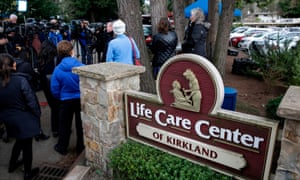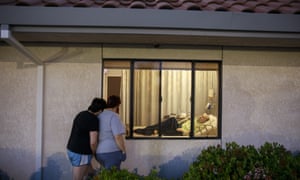Healthcare organizations insist protections are essential for under-resourced facilities as horror stories enrage families
- Coronavirus – live US updates
- Coronavirus – live global updates

Photograph: Jason Redmond/AFP via Getty Images
The US nursing home industry is clamoring for legal immunity during the coronavirus pandemic, even as horror stories from hard-hit facilities enrage families, consumer advocates and the American public.
Healthcare organizations insist liability protections are essential for under-resourced nursing homes fighting against Covid-19, while an already staggering death toll continues to climb.
Tricia Neuman, senior vice-president of the Henry J Kaiser Family Foundation, said: “The liability issue is exposing a longstanding tension between consumer advocates, who want to see the standards enforced, and owners, who are worried about the financial implications of a lawsuit.”
The US “ground zero” for the virus was a nursing home outside of Seattle. Once the country became a global hotspot, elderly Americans suffered. In some states, nursing homes have accounted for a majority of Covid-19 deaths as facilities scrambled to adapt.
Critics say the virus has ravaged nursing homes “like a brushfire”, partly because of the industry’s disastrous track record with infection control, but also because of staffing and resource deficiencies that long predate Covid-19.
Toby Edelman, a senior policy attorney at the Center for Medicare Advocacy, said: “It’s a population at risk, but this industry has a lot of serious problems that led to these enormous outbreaks in nursing homes. So I don’t think they can just say: ‘It’s not our fault, we didn’t have equipment.’
“They were supposed to have that equipment. This isn’t new.”
Some nursing homes have also faced criticism for their responses to Covid-19 that have only fanned the outbreaks’ flames.
Mike Dark, a staff attorney at California Advocates for Nursing Home Reform, said: “Facilities mostly don’t want to flag that they have the virus even when it’s killing residents, because it’s such a publicity problem, it’s such a business problem, and they are for-profit enterprises.”

Nearly 70% of US nursing homes are for-profit, and the industry has a reputation for lackluster performance around infection control. In all longterm care facilities, which include nursing homes, somewhere between 1m and 3m serious infections are contracted annually, according to the Centers for Disease Control and Prevention.
Hundreds of thousands of people die from infections each year, even when not in the grip of a pandemic.
“Our members are working hard to do the right thing and are focused on their missions of providing care. They are on the front lines of fighting coronavirus and are full partners with hospitals and other providers,” Katie Smith Sloan, the president and CEO of LeadingAge, an association for nonprofits providing services to older people, said.
“Regulations about standards of care evolve and change rapidly; providers’ access to needed personal protective equipment and testing is limited and often insufficient.”
State officials have been quick to let nursing homes off the hook for decisions made in the midst of the public health emergency. Through a hodgepodge of laws and executive orders, at least 21 states have granted some form of civil immunity to healthcare providers, according to a tally sent to the Guardian by National Consumer Voice for Quality Long-Term Care – though in a few cases it is not clear if the immunity extends to nursing homes.
Smith Sloan wrote: “States recognize that providers require legal protection as a result of actions related to combating the Covid-19 pandemic. LeadingAge … is pursuing protections on the federal level with a coalition asking for uniform and consistent relief as well.”
Some states are including immunity from criminal liability, but policies do generally make exceptions for especially egregious treatment, including willful misconduct or gross negligence.
Richard Mollot, executive director of the Long Term Care Community Coalition, said: “To basically take away the one area of potential accountability when residents are most vulnerable to me is dumbfounding and dangerous.”
For some public health experts, however, the issue is not so cut and dried. They describe nursing homes as a sector in chronic need of reform that is nevertheless “the safety net of the safety net” for vulnerable people.
Experts acknowledge that the industry is filled with deficiencies, and is based upon a broken business model that struggles in the face of a pandemic. But they also say nursing homes have been under-prioritized by officials in a public health crisis that has disproportionately targeted their patient populations.
Michael L Barnett, a professor at the Harvard school of public health, said: “Putting a nursing home out of business because somebody died is really punishing at the wrong level, because certainly there are nursing homes that probably did not act responsibly, or they may have ignored the threat. But so did many government agencies.”
Instead of lawsuits, experts are advocating for immediate reinforcements in testing, personal protective equipment (PPE) and staff, followed by permanent fixes for longterm care. They suggest payment reform, so nursing homes are not dependent on fickle revenue streams to subsidize their Medicaid patients.
Mildred Solomon, president of the Hastings Center, warned against the “blitzkrieg of lawsuits” that these immunity measures mean to avoid.
She said: “I think we have to hold our fire, not put our energy into finger-wagging and blaming. And put more emphasis on stronger regulations, with teeth.”



